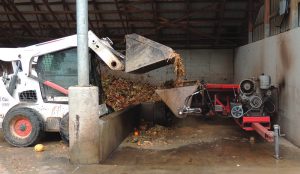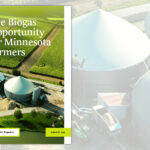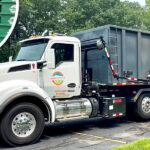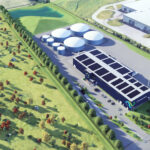BioCycle October 2014
Kirkwood, Pennsylvania: Multiple Benefits With Codigestion On Dairy Farm
Sensenig Dairy in Kirkwood installed an anaerobic digester in 2013 to process dairy and hog manure as well as chicken litter from a total of three farms — two dairy (its own and another dairy) and one raising both swine and poultry. Dairy manure from the neighboring farm is pumped to a holding tank on the Sensenig dairy. Chicken litter is slurried with hog manure and pumped to the holding tank weekly. Calcium chips in the litter are removed prior to addition of the swine manure. Preconsumer food waste from area supermarkets (about 60 tons/week) is tipped in a receiving shed, and processed in a chopper unit. “We also receive several tanker loads each week of DAF (dissolved air flotation) sludge,” notes Andrea Sensenig. The shed for receiving food waste has a sloped concrete pad with a liner underneath.
All feedstocks are blended and then pumped to the digester supplied by RCM, Inc. A portion of the digested effluent is pumped back to the farm supplying the swine manure and litter. “We can reverse the valves on the pump to return digested effluent,” she adds. Solids are dried using heat from the 200 kW biogas engine supplied by Martin Machinery, and used for bedding. Bedding not used by Sensenig Dairy is sold to other farms. Heat recovered from the engine also is used to dry corn in the fall. “We were able to stop using propane for that purpose,” notes Sensenig. The dairy has a net metering arrangement with the local utility for the electricity generated.
South San Francisco, California: Dry Digester Closes Loop For Hauler
South San Francisco Scavenger Company (SSFSC) and Blue Line Transfer, the facility that handles SSFSC’s recycling and disposal, cut the ribbon in September on its new dry anaerobic digestion system that will process food scraps and yard waste collected by SSFSC. Biogas produced will be conditioned and compressed into CNG for use in the company’s collection fleet. The fully enclosed system, supplied by Zero Waste Energy, LLC, is designed to process 11,200 tons/year of food scraps and food soiled paper collected from businesses in the company’s service area, including South San Francisco, Brisbane, Millbrae, Colma and San Francisco International Airport. “”It’s a truly closed loop system,” said Doug Button, president of SSFSC and Blue Line Transfer at the ribbon cutting ceremony. Besides producing up to 500 Diesel Gallon Equivalents (DGE) per day of carbon negative biogenic (renewable) CNG, digestate from the process will be used to make a certified organic compost. The facility is part of SSFSC’s expanded business collection program for food scraps and food soiled paper, which will eventually service residential sector customers as well.
Andover, Massachusetts: Whole Foods Market Diverts To AD
Whole Foods Market has 37 grocery stores in its North Atlantic Region; 29 of those are in Massachusetts. “All but two of our Massachusetts stores are on a commercial organics diversion program, primarily to composting” said Karen Franczyk, Green Mission Coordinator for the North Atlantic Region on September 22, shortly before the Massachusetts’ ban on commercial organics disposal was going into effect on October 1. To bring the remaining stores into compliance, Whole Foods Market was installing Grind2Energy organics processing systems at the remaining two stores, both of which are in dense, urban locations. “These stores have very tight spaces in the back rooms where there isn’t really room for totes to collect organics,” Franczyk explains.
Whole Foods Market installed a Grind2Energy System, including a 3,000-gallon storage tank for the slurry, at its store in Andover in late spring, giving the company an opportunity to try out the equipment. The slurry is collected every 10 to 14 days by Casella Organics and taken to either AGreen Energy’s Jordan Farm in Rutland or Barstow’s Longview Farm in Hadley (both in Massachusetts) for codigestion with dairy manure. “Some adjustments had to be made initially to the grinder to handle meat we were putting in,” she notes. “This process is definitely a good way to catch contamination, as a team member has to manually move material to the grinder inlet and can see items such as rubber bands and produce bags.” A disadvantage of the system is that unlike composting, paper, compostable containers and waxed cardboard cannot be diverted with the food waste. The store uses 10-gallon containers to collect material from various departments, and transports them to the grinder on a cart.
Conyers, Georgia: Digester Project Receives State Permit
The Georgia Environmental Protection Division (EPD) issued a Solid Waste Handling Permit in July to Conyers Renewable Power, LLC for construction and operation of the Conyers Renewable Power Anaerobic Digestion (AD) Facility in Rockdale County east of Conyers. The company developing the digester, First Generation Energy, also received a permit from EPD to construct and operate an AD plant (under the name Augusta Renewable Power, LLC) in Richmond County near Augusta. Both facilities will utilize the Eisenmann high solids AD system to process source separated organics, including commercial and industrial food waste streams. Each will be designed with capacity to process about 53,000 tons/year of feedstock. Biogas will be used to generate electricity or be conditioned and compressed into a transportation biofuel. Caterpillar will be installing CHP cogeneration engines made by MWM.
Boston, Massachusetts: State Agency Considers Clean Energy Standard
The Massachusetts Clean Energy and Climate Plan (CECP) calls for a market-based framework to provide a clear signal to the electricity market to improve upon the “cleaner energy portfolios of the last few years,” states the Plan, which includes a Clean Energy Standard as an option to consider to establish the framework. A Clean Energy Standard (CES) would “require electricity suppliers to favor lower- and no-emissions sources in the mix of electricity delivered to their customers.” The Massachusetts Department of Environmental Protection (MADEP) intends to propose a CES, and is holding a stakeholder meeting in Boston on October 27 to receive feedback on the CES concept and a draft regulation that would establish one.
Based on a review and analysis of potential CES designs conducted in 2013, MADEP concluded that the most viable program structure for a CES in Massachusetts is a share-of-sales requirement for electricity suppliers. A share-of-sales requirement would be structured similarly to the Massachusetts Department of Energy Resources’ existing Renewable Portfolio Standard (RPS) program, but would include additional clean generation technologies not eligible for RPS, such as new hydroelectric generation and unforeseen technologies with low or no greenhouse gas (GHG) emissions. MADEP also requests comments on the following specific aspects of the CES: which generation technologies will count as clean energy, other than those already included in the RPS program; should eligibility be limited to new generators, or should eligible existing generators be included (and how is “new” defined); the compliance obligation of municipal utilities; and the stringency and timeline of emission reductions. The discussion draft regulation places the questions above in the context of relevant regulatory language, and raises a number of technical issues for stakeholder consideration. MADEP also requests stakeholder input on all aspects of the CES, including proposed revisions to associated GHG reporting requirements.














